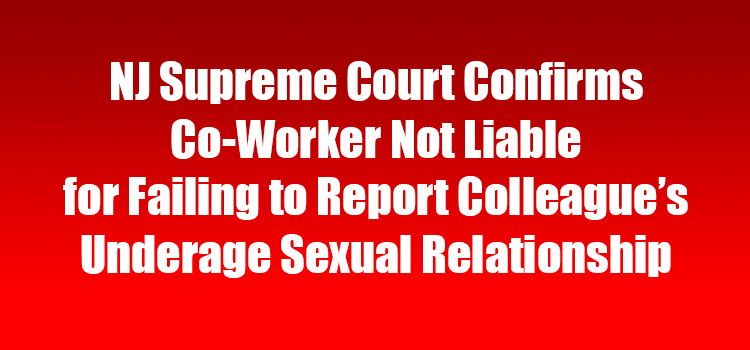In G.A.-H. v. K.G.G., (A-25/26-18/081545) (Decided June 26, 2019), the Supreme Court of New Jersey held that the employer and co-worker of a man who sexually abused a minor can’t be held liable for failing to report the abuse to law enforcement.

According to the court, no reasonable trier of fact could find that the defendant knew or had special reason to know that his co-worker was engaged in a sexual relationship with a minor. Accordingly, he had no duty to report the alleged abuse and the employer could not be held liable.
Facts of G.A.-H. v. K.G.G.
The case revolved around three main issues: whether the defendant, “Arthur,” was obligated to report that his co-worker “Kenneth” was engaged in a sexual relationship with a minor; whether their employer, GEM Ambulance, LLC (GEM), is vicariously liable for Arthur’s failure to report; and whether GEM negligently retained, trained, or supervised Arthur or Kenneth.
According to court documents, Kenneth groomed the plaintiff to trust him and began having sexual intercourse with her in September 2010, when she was 15 and he was 44. When this illegal relationship was ongoing, Kenneth worked for GEM as an emergency medical technician (EMT). While Kenneth was working, he would sometimes park a GEM ambulance near the plaintiff’s bus stop and, from there, he would walk her to her bus stop. No other GEM EMT interacted with the plaintiff on these occasions, and her bus stop could not be seen from the GEM vehicle.
Kenneth often bragged to co-workers that he was in a “relationship,” but he never identified the plaintiff by her real name or age. Kenneth often stated various ages when telling his co-workers how old his “girlfriend” was, but he never mentioned an age below the age of consent. Kenneth and Arthur worked together on several shifts, during which Kenneth would show Arthur the pictures and videos of a naked female that Kenneth had on his phone. Arthur would quickly look away from Kenneth’s phone, which was a “flip phone” with a small screen.
Kenneth’s abuse of the plaintiff ended in February 2011, when she informed her mother about her relationship with Kenneth. Plaintiff’s mother notified the police of Kenneth’s actions. Kenneth thereafter pled guilty to various criminal offenses. Plaintiff subsequently filed suit against Kenneth, Arthur, and GEM, among others, in February 2015. She maintained that Arthur should have reported Kenneth to supervisors at GEM and that GEM was vicariously liable for Arthur’s failure to report Kenneth’s conduct and also negligent in retaining, training, and supervising Arthur and Kenneth.
The trial court entered default judgment against Kenneth. The trial court granted Arthur and GEM summary judgment, holding that Arthur had no duty to report Kenneth and, moreover, that no facts created a reasonable basis for Arthur to believe Kenneth was engaged in a sexual relationship with a minor. The trial court further held that there was no basis for liability to attach to GEM.
The Appellate Division vacated the trial court’s grants of summary judgment and remanded for further development of the record, concluding that “the common law does not necessarily preclude the imposition of” a duty to report that a co-worker is engaged in a sexual relationship with a minor and the record here was not sufficiently developed to determine whether Arthur knew of Kenneth’s illicit sexual relationship with the plaintiff. In support, the appeals court cited J.S. v. R.T.H., 155 N.J. 330, 334, 342 (1998), in which the New Jersey Supreme Court held that a spouse with “knowledge or special reason to know” that her spouse was sexually abusing children had a duty to prevent or report that abuse.
Court’s Decision in G.A.-H. v. K.G.G.
The New Jersey Supreme Court reversed. It concluded that no reasonable trier of fact could find that Arthur knew or had special reason to know that Kenneth was engaged in a sexual relationship with a minor. Based on its conclusion, the court did not address whether a co-worker or employer with knowledge or a special reason to know that a co-worker or employee is engaged in a sexual relationship with a minor has a legal duty to report that co-worker or employee.
“We need not decide whether that duty should apply to co- workers because no reasonable trier of fact could find that Arthur knew or had special reason to know that Kenneth was engaged in an illegal sexual relationship with a minor,” Justice Faustino Fernandez-Vina wrote on behalf of the court.
With regard to whether Arthur knew Kenneth was engaged in a sexual relationship with a minor or a special reason to know that Kenneth was engaged in a sexual relationship with a minor, the court concluded that factual support was lacking. As Justice Fernandez-Vina explained:
It is often difficult to know someone’s age based upon appearance alone. Plaintiff claims Arthur should have known she was below the age of consent because Kenneth showed him the pictures and videos of plaintiff on Kenneth’s phone. Nothing in the record suggests that Arthur viewed any pictures or videos of plaintiff. But, even assuming he did, in order for Arthur to know that plaintiff was below the age of consent, he would have had to perceive the difference between someone who is above or below the age of consent based upon appearance alone and from a small cellphone image. A small cellphone image of a naked female does not give rise to a “special reason to know” that Kenneth was engaged in a sexual relationship with a minor. Because Arthur did not commit a tort, the court further concluded that GEM could not be held vicariously liable for his conduct. It further held that the record did not adequately support plaintiff’s claim for negligent retention, training, or supervision. “Although plaintiff
